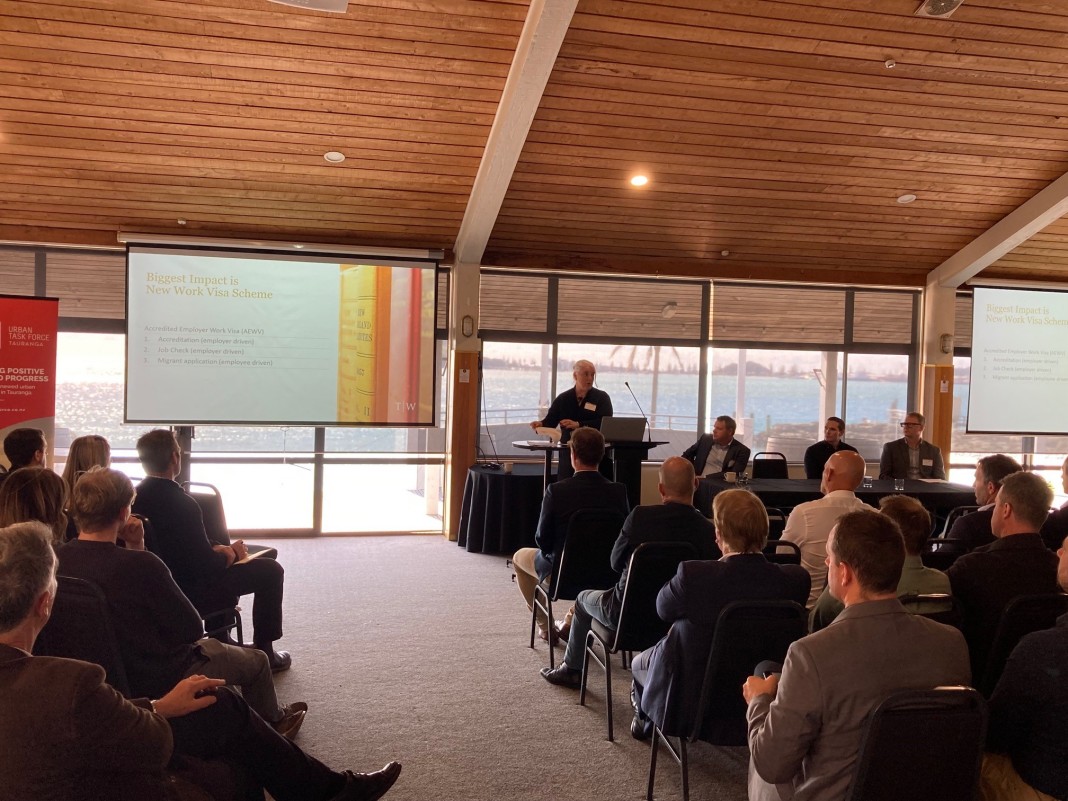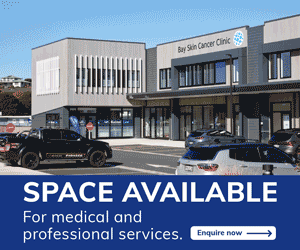Tauranga’s Urban Task Force (UTF) hosted a panel discussion focused on supply chain issues at the end of August. Employers’ immigration scheme holdups in particular were highlighted, with some degree of frustration, as a major cause for concern, not only for those in the industry, but for the economy as a whole.
The UTF was established in 2021 to provide leadership to local and central government, and local business, economic and iwi sectors. According to the group, UTF advocates for positive planning and investment decisions to create meaningful changes to the current state of Tauranga City.

The presentation, introduced by UTF’s Morgan Jones, outlined the current state of the industry from the individual perspectives of each of the four panelists.
Providing context, Priority One’s Nigel Tutt highlighted the July quarter record low unemployment rate of 2.9% for the Western Bay of Plenty. He noted that construction, property and healthcare are the largest employment sectors in the region.
He also pointed to the impacts of the current 7-8% inflation rate and labour shortages, particularly slow immigrant labour flows, as major impediments to growth. He noted competition for staff will be a significant feature of the local labour market.
Tomkins Wake’s immigration expert Michelle Urquhart touched on the impact of Covid border closures and outlined the new work visa scheme, originally announced in 2019 for launch in 2020, but then delayed by border closures until the scheme finally went live in July 2022.
She pointed out that, despite the quick uptake and processing of employer accreditations in May, a requirement for any employer now wishing to employ a migrant, the subsequent job check stage has been problematic.
“Immigration New Zealand’s system is not working the way it should and applications are getting hung up,” Urquhart noted.
She observed that the problems and delays are resulting from the obligatory job checks – the stage at which checks are made to prove no New Zealanders are available to do the job – taking so long, delaying the migrant’s ability to apply. This has been exacerbated by new system failures.
Although immigration New Zealand originally announced the first two stages, employer accreditation and job checks, would be completed in under 10 days, this target has been abandoned and they now won’t even provide a timeline.

From a commercial construction perspective, we don’t see things slowing down. Although the escalation will become less volatile, it’s not going to go into the negatives.”
– Peter McCawe
Willy Bedford from Venture Developments focused on his organisation’s experiences with residential housing and construction trends, particularly challenges to the market from climbing interest rates, property prices and escalating building costs, driven by increased consenting, material and labour costs. “All of this has resulted in significant increases to square metre rates”, he said.
Bedford calculated that building costs have increased from approximately $3000 to $4000 per square metre over the last 18 months. As a result, fixed-price building contracts have become increasingly hard to promote.
Bedford identified opportunities for developers to work collaboratively with the parties to achieve improved housing affordability.
Hawkins’ Peter McCawe highlighted escalation challenges his organisation has encountered in the commercial construction sector recently.
He described the ‘perfect storm’ caused by Covid, overlapping three areas: the loss of production time as a result of lockdowns; Shipping and transport cost increases; And continued high demand for materials and human resources.
“From a commercial construction perspective, we don’t see things slowing down. Although the escalation will become less volatile, it’s not going to go into the negatives”, he warned. “Costs will not, unfortunately, decrease – only the rates at which they increase will slow down.”
McCawe illustrated the problems identified by Urquhart for employers in the construction sector securing human resources from abroad. He described how, despite a recruitment drive in March when the borders opened that involved a trip to the UK where 50 prospective employees were interviewed and 25 offers made – to date only three have finally landed in New Zealand.
His message to employers: “Ensure that remuneration is competitive, you’ve got a healthy team culture, and that you’ve got flexible working arrangements.


















